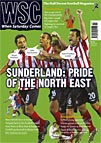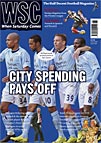 Dear WSC
Dear WSC
Bruce Wilkinson (WSC 267) pointed out that ticket queues “seem a quaint ritual of a bygone age”. Waiting in a virtual internet queue bears no similarity to lining up outside the box office. I have my tickets for the FA Cup final, but I do not feel as if I earned them. Instead of getting up in the middle of the night, crossing London, losing half a day’s work, standing in the rain shuffling forward inch by inch while nervous that there are too many punters and too few tickets, I merely sat in my dressing-gown in front the PC. There is no one to talk to in the “virtual waiting room”. Your opportunity is allotted randomly. Suddenly it’s all over and you have what you came for. One should be happier as the process is simple and efficient and the desired result achieved, but somehow it feels like a hollow victory as it lacks the sense of accomplishment joy and triumph of the old-fashioned process. You can’t even wave the tickets in triumph above your head as they are sent by post.Obviously my complaining about the changes that actually improve my life marks me down as “old”. I am not asking to bring back rickets and polio and to repeal the Factory Acts but I do miss a modicum of discomfort and inconvenience. The old experience was akin to standing on the terraces or being subject to the over-zealous policing that used to mark us out as a tribe. Under the new regime the tickets are yours if your broadband speed is faster and your credit card more golden than the next, rather than if you have more commitment stamina and perseverance.Will the ultimate progress be when we treat football like theatre and opera by dressing-up smartly for the occasion and ordering our interval drinks? Or is that Club Wembley?
Patrick Sheehy, London
Search: ' Port Vale'
Stories
 Quito’s El Nacional pick only native players, a policy that is coming under increasing pressure. Henry Mance reports
Quito’s El Nacional pick only native players, a policy that is coming under increasing pressure. Henry Mance reports
As a boy, Juan Carlos Burbano knew never to support foreigners; for a decade as a player, he tried never to pass to them; and now as a coach he is determined to beat them. Such is a life with El Nacional, the Ecuadorian club which only fields locally-born players. “If the national team can do it, why can’t El Nacional?” says Burbano, referring to Ecuador’s unprecedented qualification for the 2002 and 2006 World Cups. “We’ve got low self-esteem in Ecuador, and sport has helped it recover”. El Nacional’s “pure creoles” rule was the idea of their founder, an army captain. Forty-five years later the rule remains, as does military control.
 Jonathan Wilson reports on the region of Serbia that may have produced a golden generation
Jonathan Wilson reports on the region of Serbia that may have produced a golden generation
Serbian football ought to be downtrodden. There is no new money there to purchase a fleet of promising Brazilians, corruption and crowd violence are rife, and attendances are falling. And yet, despite it all, there is genuine hope, and it lies in an extraordinary generation of youth players.
 Barcelona’s defeat of Manchester United was considered a victory for good in the press. But is it really so simple, asks Ashley Shaw
Barcelona’s defeat of Manchester United was considered a victory for good in the press. But is it really so simple, asks Ashley Shaw
So good triumphed over evil in football’s version of the moral maze. Fan-owned Barcelona, the club that proclaims itself as mes que un club (more than a club), Catalonia’s national team, won the European Cup at a canter by beating privately-owned, debt-saddled Manchester United where the ticket prices make your eyes water and the PR spin-cycle is always on high.
 Dear WSC
Dear WSC
AFC Wimbledon fan Aled Thomas (Letters, WSC 267) bemoans people not knowing what to call his club. He would have enjoyed this exchange on Talksport on a recent Saturday when they decided to venture south of the Premier League, for a change. Ian Danter: “AFC Wimbledon could gain promotion to the Conference today.” Micky Quinn: “Is that the original club?” Danter (hesitantly): “Yes.” Quinn: “Do they still play at Plough Lane?” Why so knowledgeable?
Glyn Berrington, Brierley Hill